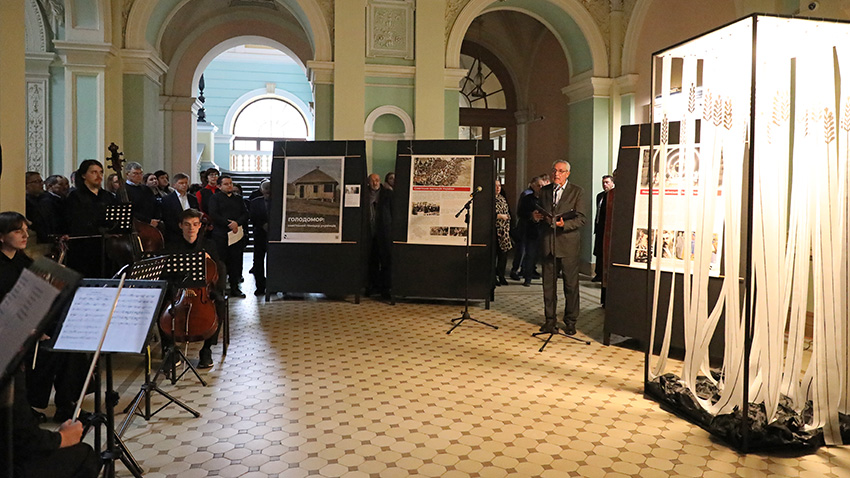Every year, on the last Saturday of November, Ukraine commemorates the millions of victims of the Holodomor of 1932–1933, the genocide of the Ukrainian people committed by the Stalinist regime. For years, the truth about this tragedy was hidden, but today Ukrainians are telling the world that the famine was not an accident but the result of a criminal communist policy. Thousands of testimonies collected in the people’s memorial book The 33rd Famine have forever captured the horrors of that time in history.
The day before, Lviv Polytechnic hosted an hour-long requiem dedicated to Memorial Day, as well as a presentation of the exhibition «Holodomor: Soviet Genocide of Ukrainians» by the National Museum of the Holodomor-Genocide in the lobby of the main building.
At the beginning of the event, Professor Yurii Bobalo, Rector of Lviv Polytechnic National University, reminded the audience of the historical background and consequences of the Holodomor in Ukraine and urged to remember the crimes of the communist regime against the Ukrainian people:
– During 1932–1933, almost all the grain grown in Ukrainian villages was taken away. The grain procurement plans set for Ukraine were economically unrealistic. At a certain stage, the heads and representatives of the authorities conducted house-to-house searches, taking away all the food from the villagers, including that which had already been cooked in the kitchen. Having artificially created a situation where Ukrainians began to die of starvation en masse, the Soviet authorities took measures to prevent them moving to other regions of the USSR where there was no famine. On the borders of Ukraine, the Communists deployed armed barrier units that did not allow people to leave Ukraine. The crimes of genocide against Ukrainians were the culminating stages of the establishment of Russian imperialism in Ukraine.
To present the exhibition «The Holodomor: Soviet Genocide of Ukrainians», Doctor of Historical Sciences, Professor Bohdan Levyk was invited to give a speech. He first of all emphasised the legal aspect of covering the events of the Holodomor in Ukraine in the international arena:
– The crime of Nazism is condemned internationally, but the communist crime of the Holodomor-genocide of the Ukrainian people in 1932–1933 has not received such an assessment in international law yet. To date, only 22 countries have recognised the Ukrainian Holodomor as genocide. The Russian authorities still deny that the communists of the VKPB (the All-Union Communist Party of Bolsheviks) deliberately caused a great famine in Ukraine. According to the lowest estimates of scientists, the number of victims is four million. We need to understand why the Holodomor happened, who committed it, and how we can prevent similar tragedies. Russia is not telling the truth about its history. Russian historians crossed the red lines of academic integrity, violating the principle of research. Successor systems adhere to the principle of silence and falsification. We must tell the world our history by ourselves as it is ours!
Bohdan Levyk also noted that the exhibition was the result of a memorandum signed by Yuriy Bobalo, Rector of Lviv Polytechnic and Lesia Hasydzhak, Director of the National Museum of the Holodomor-Genocide. The exhibition will run until the end of November.
